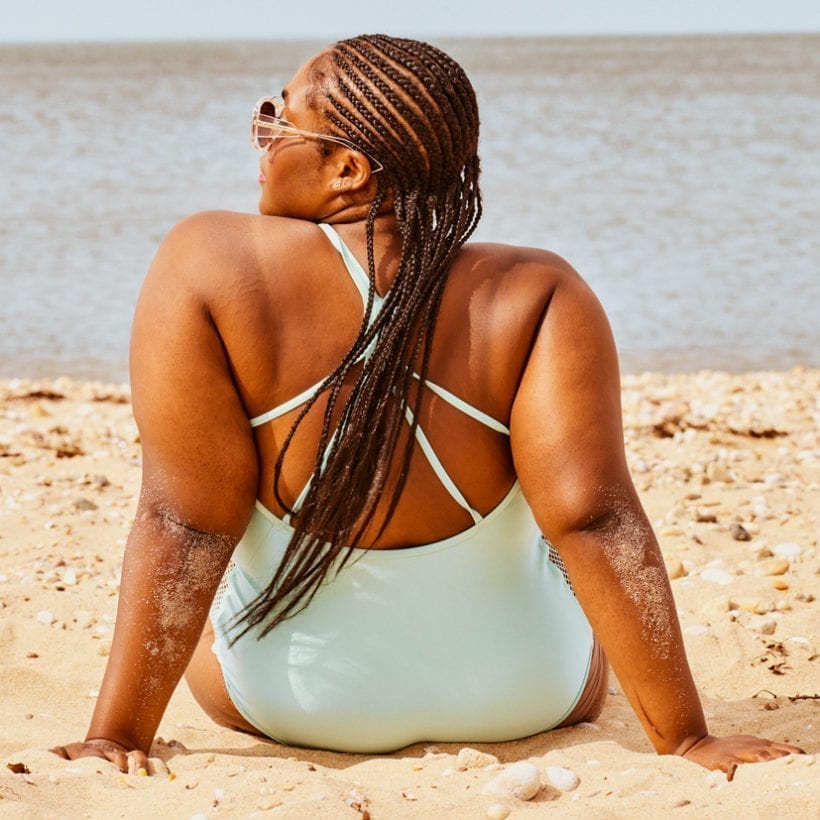You already know that you’re supposed to be wearing sunscreen every day but let’s face it: in the winter months (or just saying, when you’re inside all the time due to a pandemic) you may opt for a moisturizer with a low SPF, or — derms close your eyes — maybe you even skip the sunblock some days. Now that we prepare for a summer that will hopefully be spent at pools, beaches, and just generally outside jumping into the arms of friends, chances are you’ll be reaching for a sunscreen that didn’t get much airtime last summer. If you find yourself dusting off an old bottle or tube of SPF, you’ll want to know if sunscreen can expire. Here we spoke to two doctors to get the scoop, and spoiler alert, it may be time to toss that old tube.
Does sunscreen expire?
The short answer here is yes, sunscreen does expire. And unlike using an expired mascara, for example, which may be dry and hard to use but is usually pretty harmless, using an expired sunscreen can actually put your skin in danger. “There are many ingredients in sunscreen, and, just like food, the recipe can go bad,” Alexis Parcells, MD, board-certified plastic surgeon and owner of Parcells Plastic Surgery, tells Sunday Edit. Why does this matter? “With time, certain components of the cream will start to break down, and this affects the sun protective quality of the product, leaving you with an increased risk of sun damage and skin cancer,” Dr. Parcells adds.
How long does sunscreen last?
The FDA considers sunscreen a non-prescription drug and therefore requires that it have an expiration date, “unless stability testing conducted by the manufacturer has shown that the product will remain stable for at least three years,” per the FDA’s website. This gets tricky if, like me, you can’t even remember what you ate for lunch yesterday let alone when you purchased your sunscreen or if you can’t find an expiration listed on the bottle itself or on the packaging (which is probably long gone).

“Expiration dates are stamped on sunscreen containers to specify the time limit for the product’s stability and efficacy,” Hadley King, MD, board-certified dermatologist tells Sunday Edit. “This is often found on the backs of bottles or on the crimp end of tubes. For optimal sun protection, as well as texture, stability, and sterility, use the sunscreen prior to the expiration date.”
If you can’t find the expiration date and you don’t remember when you bought it, Dr. Parcells suggests the following to discern if your sunscreen has expired. “The first thing you can do is open the bottle and smell it. If it smells rotten or overly sweet, toss it,” she says. If the smell seems normal, put a little bit on a stable surface like a table or your bathroom vanity and check out how the sunscreen physically looks. She adds that a watery consistency is often the first sign of sunscreen gone bad. If the cream breaks apart and the texture feels off, it’s a good idea to replace it.
When does sunscreen expire?
It’s hard to generalize about exactly how long sunscreen will last because expiration dates will vary by brand and formula. “If properly stored and temperature-regulated, sunscreen is designed to remain at their original strength for up to three years,” Parcells says.
Expiration dates will also vary depending on whether your favorite sunscreen is chemical or physical (Sunday Riley Light Hearted Sunscreen is a hybrid of both).
You’ll want to pay especially close attention to your SPF’s expiration date if you are using a chemical sunscreen (which is made typically with avobenzone, octinoxate and oxybenzone) as chemical sunscreen ingredients are less stable than physical sunscreen ingredients, Dr. King says. “Chemical sunscreen consists of innately unstable molecules, but in the past few years manufacturers have started adding stabilizers like octocrylene,” Dr. King explains. On the other hand, physical sunscreens with zinc oxide and titanium dioxide are more stable and usually have longer shelf lives. “They are photostable, [meaning] they do not change their molecular structure when exposed to UV radiation but the formulations can become clumpy and less pleasant to use over time.”
Regardless if you’re using a physical or chemical sunscreen, the way you care for your sunscreen will help it last and work to its full potential. Dr. Parcells says to retain its strength, avoid storing SPF in your car or leaving it in your beach bag in the sun. Your cellphone probably has a temperature-gage on it, so every time you move your phone out of the sun, remember to do the same with your SPF.
We only recommend products we have independently researched, tested, and loved. If you purchase a product found through our links, Sunday Edit may earn an affiliate commission.







